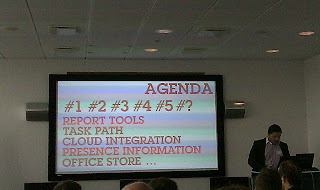
Went to Microsoft today and heard about the major improvements. Together with the good guys from Projectum I heard about:
- As always new and more easy reporting tools. One can wonder why they pay more attention to the output than the input?
- Tast path is a really nice thing - point to a task and see all direct predecessors and successors.
- SkyDrive - of course
- Presence information - yes now you got all contack info at each resource - Project is going Social!
- And fianlly a store where you can get or buy nice customermade reports, setups, forms etc. - ex. you can find an Agile form!











